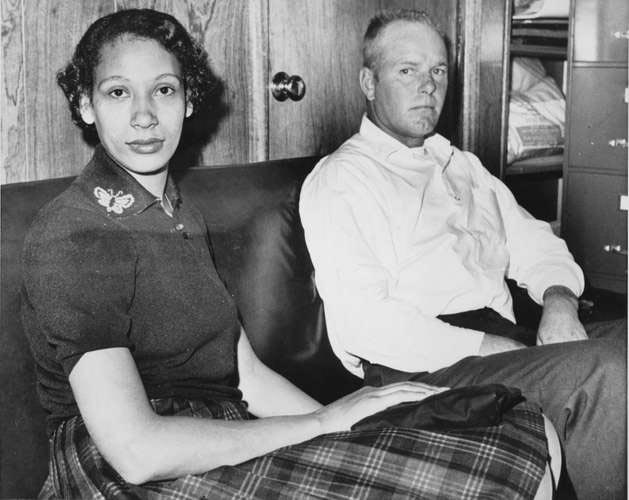July 11, 1958 – 2:00 a.m. In the middle of the night, Mildred and Richard Loving awoke abruptly in their Caroline County home to local authorities shining flashlights in their faces. When the police demanded to know who the woman sleeping next to Richard was, Mildred responded, “I’m his wife.”
“Not here you’re not,” they retorted.
The Lovings, who were married just five weeks before, were arrested for violating the Racial Integrity Act; their interracial marriage was unlawful in the state of Virginia.
Richard was white.
Mildred was mixed of African-American and Rappahannock Indian heritage.
Richard spent a night in prison.
Mildred, who was pregnant with their first child, spent several nights in prison.

Together, they pleaded guilty and were given the choice by Judge Leon M. Bazile to return to prison for a year or leave Virginia for 25 years. For the next nine years of their lives, they lived in Washington, D.C. in exile, away from their family, friends, jobs, and community.
City life was more than just a small adjustment for the Lovings, who were raising a family of three young children. When one of their sons was hit by a car and injured, Mildred decided their life outside of Virginia had to end. She wrote to Attorney General Robert F. Kennedy for guidance, who referred her to the American Civil Liberties Union. It was then that a young couple from a small town, who were self-proclaimed “simple people” were the face of the now landmark Supreme Court Case: Loving v. Virginia.
Their lawyer for the case was Bernard S. Cohen from the ACLU. Cohen was born in 1934 in Brooklyn, New York. He was the proud son of a immigrant Jewish fur worker. Respect for the working-class and oppressed communities fueled his decision to attend law school at Georgetown University.
In 1967, Cohen was 33 years old and just a few years fresh out of law school when he argued on behalf of Mildred and Richard Loving before the Supreme Court of the United States. The Lovings chose to be absent during these arguments, and when Cohen asked what Richard Loving wanted to convey to the court, he told him, “Mr. Cohen, tell the Court I love my wife and it is just unfair that I can’t live with her in Virginia.”
Bernard Cohen did just that.
With the assistance of his co-counsel Philip Hirschkop, their arguments led the Supreme Court to unanimously rule on June 12, 1967 that laws prohibiting interracial marriage were unconstitutional.
For Mildred and Richard Loving, the case wasn’t about recognition or glory. They simply wanted to return home, together. Thanks to Bernard Cohen, they were able to live and love freely. His efforts with the sacrifice and bravery of the Lovings eventually opened the door for all interracial couples to wed in the United States.
Despite the backlash of malicious phone calls, lost friendships, and an anonymous instigator who put sugar in his car engine, Cohen continued to fight for equality for the rest of his career, particular through his work on decriminalizing homosexuality.
In his later life, Cohen resided in Fredericksburg, VA at a senior care facility. On his 85th birthday last year, the center wanted to do something special for him: they threw a viewing party of the 2016 Hollywood film, Loving. He modestly sat in the middle of the room amongst residents and family as they watched a pivotal point in our country’s history, in the Loving’s family history, and in Bernard Cohen’s legacy.
Bernard Cohen passed away in Fredericksburg on October 13, 2020 at the age of 86.
Because of him, Virginia is for Lovers.

